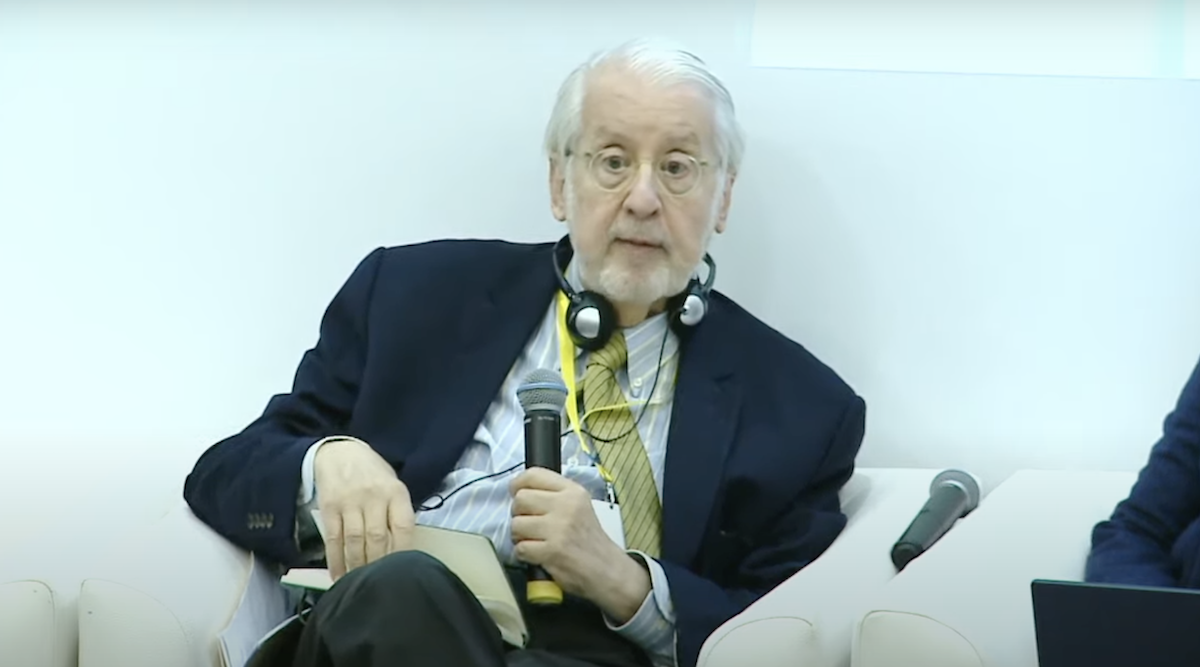The 2025 Arab Land Conference marked an important milestone in the global effort to protect housing and property rights for refugees and displaced persons with the launch of the Pinheiro Principles Handbook for the Middle East and North Africa (MENA) region. This publication—developed through years of consultations, case studies, and collaborative efforts by UN agencies (FAO, IOM, OHCHR, UN-Habitat, NRC, and UNHCR)—aims to provide concrete guidance on implementing the Pinheiro Principles to restore the housing and land rights of displaced populations in the region.
The launch event brought together leading experts, policymakers, and humanitarian practitioners to discuss the critical role of land restitution in peacebuilding, post-conflict recovery, and the protection of human rights. The session underscored how land dispossession fuels conflicts and how effective land administration can be a tool for reconciliation and economic stability.
With Dr. Paulo Sérgio Pinheiro, the author of the Pinheiro Principles, as the keynote speaker, the session was a landmark moment in shaping sustainable solutions for displacement, housing restitution, and land governance in MENA.
Key Takeaways from the Launch Event
1. The Importance of the Pinheiro Principles in Addressing Displacement
Dr. Paulo Sérgio Pinheiro, Chair of the Independent International Commission of Inquiry on the Syrian Arab Republic, reflected on the journey of the Pinheiro Principles since their adoption in 2005.
“The MENA region has witnessed both promising practices and significant challenges in the realization of housing and property restitution rights. The handbook is a testimony to the commitment of the international community to fulfill these rights.”
He emphasized that housing, land, and property (HLP) rights must be at the core of peacebuilding efforts, as land dispossession is often used as a weapon of war. He also acknowledged the handbook’s role in ensuring that the principles remain a practical tool for policymakers and humanitarian actors working in displacement contexts.
“I am thrilled to see this work taken forward, ensuring that these principles remain part of reality and serve the very people for whom they were created.”
2. UN-Habitat’s Role in Land Governance and Crisis Response
Ombretta Tempra, Human Settlements Officer at UN-Habitat, highlighted how land administration intersects with humanitarian response and sustainable development.
“The Pinheiro Principles have been a lighthouse for practitioners working at the intersection of land governance and humanitarian crises. Housing, land, and property rights violations are used as tools of war—land dispossession fuels conflict and must be addressed in post-war recovery.”
She emphasized how documenting HLP claims and securing women's land rights are crucial for building lasting peace.
“UN-Habitat has worked on securing restitution for displaced populations in Iraq, Syria, and Somalia. Without land tenure security, refugees and internally displaced persons (IDPs) remain vulnerable to perpetual displacement.”
Tempra also introduced Principle 15, which supports fit-for-purpose land administration approaches, particularly in war-torn areas. She cited the case of the Yazidi population in Iraq, where community-led land mapping and incremental land registration systems are being used to restore property rights after years of persecution.
3. The FAO’s Perspective: Linking Land Rights to Food Security and Resilience
Fidaa F. Haddad, Senior Programme Officer at FAO, connected the right to housing and land with food security and environmental sustainability.
“The right to land is directly linked to the right to food. When refugees and IDPs lose access to land, they lose their ability to sustain their livelihoods. The Pinheiro Principles provide a framework for restoring these rights and integrating displaced populations into productive land use.”
She shared examples from Lebanon and Jordan, where FAO has helped displaced populations gain temporary access to agricultural land, enabling them to sustain their livelihoods while awaiting restitution.
“We have successfully implemented programs where Syrian refugees and host communities collaborate on agricultural restoration. Such models help prevent conflict over land and water resources while ensuring food security.”
4. NRC’s Approach: Humanitarian Response and Restitution in Crisis Contexts
Jim Robinson, Co-Coordinator of the Global Housing, Land and Property Area of Responsibility (HLP AoR) at NRC, provided insights into how the Pinheiro Principles serve as a roadmap for humanitarian action in conflict settings.
“Restitution is not just about returning land—it’s about justice. No durable solution can be reached unless we address HLP restitution in a principled and fair manner.”
He explained how the NRC and partners use the principles as an advocacy tool to ensure that governments, donors, and agencies recognize restitution rights in their response strategies.
“One of the biggest challenges is that many displaced people have lost their land documents. Through NRC’s programs in Iraq and Ukraine, we are finding alternative forms of documentation to help displaced populations reclaim their rights.”
Robinson also emphasized the need for dispute resolution mechanisms to prevent secondary occupation conflicts, citing cases where displaced persons return to find their homes occupied by others.
“We must balance restitution claims with the rights of secondary occupants. Mediation and legal pathways are critical to ensuring just outcomes.”
5. The Role of Civil Society in Advocating for Land Rights
Ahmed Mansour, Regional Coordinator at Habitat International Coalition’s Housing and Land Rights Network (HIC-HLRN), brought the civil society perspective, emphasizing the need for stronger legal frameworks.
“One of the biggest obstacles in the MENA region is that laws and institutions are not always strong enough to enforce land restitution. Political will is crucial.”
He called for the Arab League to take a leading role in launching an initiative on land and housing restitution, ensuring that governments commit to implementing the Pinheiro Principles at a national level.
“We must recognize that local customs and traditions often override legal frameworks, particularly in rural areas. A human rights-based approach must be complemented by community engagement.”
Key Conclusions and Next Steps
The launch of the Pinheiro Principles Handbook for the MENA region reinforced the urgent need for a coordinated, multi-sectoral approach to land restitution and housing rights for displaced populations. Key takeaways include:
- Housing and land restitution are essential for peacebuilding and social reconciliation.
- Governments must take legal and policy measures to prevent land dispossession.
- Documenting HLP claims is crucial for ensuring justice and restitution.
- Humanitarian actors must work with governments to create practical restitution mechanisms.
- A regional framework under the Arab League could help advance land rights for refugees and IDPs.
As conflicts, forced displacement, and climate-induced migration continue to shape the MENA region, securing land and housing rights must be prioritized as a foundation for durable solutions. The Pinheiro Principles Handbook offers a guiding framework for policymakers, humanitarian agencies, and civil society to uphold the rights of displaced populations and ensure their access to restitution, justice, and sustainable livelihoods.


